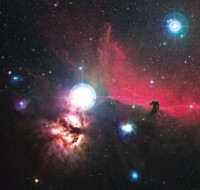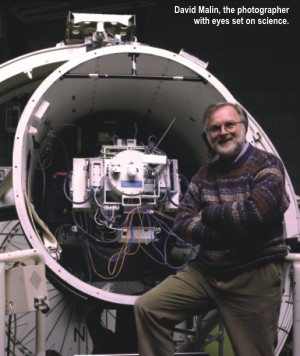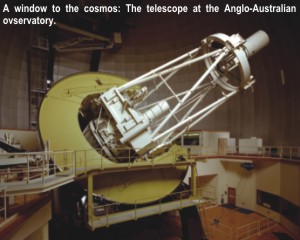|
Science
The
Cosmic Touch
Mustafa
Zaman
“They
are a mixture of art and science." This is how David
Malin defines the work he does. "The pictures I take
are natural scenes but they are not scenes that you can
see with your eyes, as they are too far away. You need special
equipment like telescopes to produce the images, but they
certainly are part of the natural world," he clarifies.
 Malin
is an astro-photographer of international repute. His works
appeared in many publications. "It is his photos that
I have been appreciating in many posters and calendars for
years without giving much thought to his name," reveals
Milon, who is the energy behind the Bangladesh Astronomical
Association. Malin
is an astro-photographer of international repute. His works
appeared in many publications. "It is his photos that
I have been appreciating in many posters and calendars for
years without giving much thought to his name," reveals
Milon, who is the energy behind the Bangladesh Astronomical
Association.
The
ability to beguile the mortals of this planet with glimpses
of heavenly bodies is the specialty of Malin. It is the
British Council who flew this Briton in from "down
under" to Dhaka as part of a series of programmes centred
on astronomy. His work is one of the highlights of the month-long
programme that the British Council, the Ministry of Science
and Tenchnology and the Bangladesh Astronomical Association
have arranged in collaboration to induce an interest in
astronomy among Dhakaites. There is an exhibition called,
"Exploring the Solar System" as part of the programmes.
As for Malin, he arrived in Dhaka just for a week to introduce
Cafe Scientific, an informal way to have discourse among
the participants, and give talks mostly to school children.
"The
concept of 'cafe scientific' came from France. It imitates
a cafe environment where people talk about the issues of
the day, except that the issues have to do with science.
And it is done in the presence of one or two scientists
to get people started. In Australia we had a great success
with this programme," Malin emphasises. He hopes it
will have the same effect on Bangladeshis.
Syed
Masud Hossain, the Culture and Science Programme Manager
of the British Council, testifies that the kind of feedback
the programmes have received is inspiring. "Even Malin
was impressed with the quality of the questions he had to
face in two schools he went to on the second day of his
visit," he adds.
The
craft behind astro-photography is unique. The imaging technique
certainly differs from all other photographic fields. Without
the knowledge of astronomy, an astro-photographer will have
no handle on the subject that he deals with. However, it
is the end results that are of prime importance. The images
become the window to a world that remains inaccessible for
most of us. For them the photos replicate the real experience
of peeking through the telescope.
 Malin
sees himself as a scientist "exploring scientific information
of images". But, he is emphatic about the aesthetic
aspect as well. He says that the aesthetics never compromise
the science. But the pictures that carry the scientific
information are often aesthetically pleasing. "They
go together, but science always comes first," Malin
points out, never losing sight of priorities. Malin
sees himself as a scientist "exploring scientific information
of images". But, he is emphatic about the aesthetic
aspect as well. He says that the aesthetics never compromise
the science. But the pictures that carry the scientific
information are often aesthetically pleasing. "They
go together, but science always comes first," Malin
points out, never losing sight of priorities.
As an
astronomer he had received no formal education or training.
"I am an astronomer now, but I was not when I joined
the observatory back in 1975. I began to make some important
discoveries quite quickly, I rapidly began writing research
papers on astronomy and is now classified as an astronomer,"
he explains. "The Anglo-Australian Observatory, where
he worked for 26 years, was in a sense like a university.
If one has the intelligence and is ready to take the challenges,
there are some senior arthromeres who would teach one the
essence of many things," he adds.
Malin's
career began in the 1960s. As a photographer he first dabbled
into the microscopic world. "In a sense it was exactly
the same. You are photographing some image that most people
have never seen, providing scientific information both to
a non-scientist and a scientist." Maline considers
himself to be a visual person, one who "responds strongly
to the things that one sees".
When
he was six or seven years old, he found an old fashion box
camera in his grandparent's house. "I discovered that
if you took the back of this thing and put a piece of tissue
paper at the back you could see on the paper the picture
of the world upside down and in colour. It fascinated me,"
Malin reflects. The fascination for visuals provoked him
to work for a big international chemical company in the
north of England, where he used photographs to solve chemical
problems and it is the company that paid for his subsequent
university education. He completed his study part-time,
which "took seven and a half years to complete".
 It
was not until 1975 that he went to Australia and began his
work on the macrocosmic world. "I took up a job at
the Anglo-Australian Observatory, which was then a completely
new institution," remembers Malin. It was in August
of 1975 that he joined the institution and immediately started
taking pictures using the newly set-up large telescope.
"Luckily, I was able to use some of the techniques
invented for the microscopic work on the telescope plates,"
Malin recalls. Retired in July 2001, he now runs his own
business alongside maintaining a website. It
was not until 1975 that he went to Australia and began his
work on the macrocosmic world. "I took up a job at
the Anglo-Australian Observatory, which was then a completely
new institution," remembers Malin. It was in August
of 1975 that he joined the institution and immediately started
taking pictures using the newly set-up large telescope.
"Luckily, I was able to use some of the techniques
invented for the microscopic work on the telescope plates,"
Malin recalls. Retired in July 2001, he now runs his own
business alongside maintaining a website.
The
sky of Bangladesh is hard to penetrate; compared to Australia's
it comes with navigational hazards. "You never get
a good view of the sky in Dhaka. The weather as well as
the pollution makes it difficult for astronomy," says
Malin, who is all too impressed by the children interested
in taking the course that he took at his early years. "You
don't need an expensive camera for this," assures Malin.
The motivation is one thing that helped perch him on the
apex of his ambition and it is motivation, he believes,
that may finally get some of the enthusiastic Bangladeshi
children to make some forays into the vast and bountiful
cosmos.
Copyright
(R) thedailystar.net 2004
| 